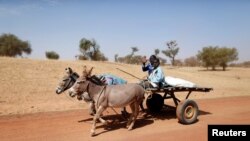A U.N. refugee agency report issued earlier this month finds thousands of children in Mali are being exploited and abused by criminal or armed groups, tribal chiefs and state authorities for profit and personal gain.
The report presents a horrific picture of unscrupulous people feeding off the misery of the most vulnerable members of society to enrich themselves. The U.N. refugee agency reports conflict, COVID-19 and worsening socio-economic conditions have led to an upsurge in child-trafficking in Mali.
It says armed groups are forcibly recruiting children to fight their wars. UNHCR spokeswoman, Shabia Mantoo, tells VOA that armed groups are trafficking children to work in gold mines and using the profits from their labor to fuel the arms trade and perpetuate their violent exploits.
“Humanitarian assessments have found children working across mines in a country where they are exposed to some of the worst forms of abuses, whether that is physical, sexual, psychological abuse of child labor, economic exploitation," Mantoo said. "And we are also seeing girls being married off early. Reports are really worrying of the risks of children being married off early to help their families because people just cannot cope.”
The report says many children are unable to go to school because of conflict and the coronavirus pandemic. This makes them particularly vulnerable and pushes many to work in informal gold mines. It says an estimated 6,000 children, mostly boys, are working in eight mine sites in the country.
Mantoo says it is not possible to get a comprehensive figure on the number of children who are being trafficked, forced into sexual or domestic servitude, married off and otherwise exploited.
“We know from documented figures in the first half of this year, there were 230 cases of child recruitment," Mantoo said. "And, when you compare that to the whole of last year, there were 215 cases. So, in a six-month period we are seeing basically what we are seeing last year, so that is a really troubling indicator. It does not show the extent of the problem, but it shows of the cases that are being documented, they are certainly increasing.
The UNHCR says refugees, asylum seekers and migrants, as well as Malians, are victims of traffickers. Despite the conflict and COVID-19, the agency notes Mali continues to be a critical transit country for people attempting to reach northern Africa and Europe. It says people on the move are particularly vulnerable to unscrupulous traffickers and smugglers.




